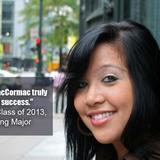- St. Augustine College is an independent, bilingual (dual language) institution of higher education created under the auspices of the Episcopal Diocese to make the American system of higher education accessible to a diverse student population, with emphasis on those of Hispanic descent; to strengthen ethnic identity; to reinforce cultural interaction; and to build a bridge to fill cultural, educational, and socio-economic gaps.
School Highlights
St. Augustine College serves 954 students (62% of students are full-time).
The college's student-teacher ratio of 7:1 is lower than the state community college average of 21:1.
Minority enrollment is 98% of the student body (majority Hispanic), which is more than the state average of 53%.
Quick Facts (2026)
- Enrollment: 954 students
- Private-state tuition: $9,576
- Student-teacher ratio: 7:1
- Minority enrollment: 98%
- Source: Integrated Postsecondary Education Data System (IPEDS)
Top Rankings
St. Augustine College ranks among the top 20% of public schools in Illinois for:
Category
Attribute
Debt For Students
School Overview
The teacher population of 132 teachers has stayed relatively flat over five years.
St. Augustine College
(IL) Community College Avg.
Carnegie Classification
Baccalaureate/Associate's Colleges: Mixed Baccalaureate/Associate's
Associate's Colleges: Mixed Transfer/Career & Technical-High Nontraditional
Institution Level
Four or more years
At least 2 but less than 4 years
Institution Control
Private not-for-profit
Public
Total Faculty
132 staff
239 staff
School Calendar
Student Body
The student population of St. Augustine College has grown by 5% over five years.
The student-teacher ratio of 7:1 has decreased from 18:1 over five years.
The St. Augustine College diversity score of 0.41 is less than the state average of 0.69. The school's diversity has grown by 49% over five years.
Total Enrollment
954 students
3,838 students
Student-Teacher Ratio
7:1
21:1
# Full-Time Students
587 students
1,091 students
# Part-Time Students
367 students
2,747 students
# Enrollment Undergraduate
954 students
328 students
# Full-Time Undergraduate Students
587 students
1,091 students
# Full-Time Graduate Students
n/a
43 students
# Part-Time Undergraduate Students
367 students
3,310 students
# Part-Time Graduate Students
n/a
18 students
Total Dormitory Capacity
n/a
132 students
% American Indian/Alaskan
n/a
n/a
% Asian
3%
6%
% Hispanic
76%
26%
% Black
6%
13%
% White
2%
47%
% Hawaiian
n/a
n/a
% Two or more races
n/a
3%
% Non Resident races
4%
1%
% Unknown races
8%
4%
Diversity Score
0.41
0.69
College Completion Rate (Students who graduate in less than 4 years)
n/a
40%
College Completion Rate (Students who graduate in 4 years or more than 4 years)
23%
55%
Average Graduate Earnings (10 Years)
$26,700
$31,800
Tuition and Acceptance Rate
The private state tuition of $9,576 is less than the state average of $14,261. The private state tuition has declined by 20% over four years.
Private State Tuition Fees
$9,576
$14,261
Tuition Notes
$537 per credit hour
% Students Receiving Some Financial Aid
89%
81%
Median Debt for Graduates
$4,083
$8,029
Median Debt for Dropouts
$2,250
$4,549
Acceptance Rate
n/a
89%
SAT Reading
n/a
390
SAT Math
n/a
360
SAT Writing
n/a
355
ACT Composite
n/a
17
ACT English
n/a
17
ACT Math
n/a
17
Source: 2024 (or latest year available) Integrated Postsecondary Education Data System (IPEDS) , School Administrators
School Notes
- On October 7, 1980, the Illinois State Board of Higher Education granted operating authority to the first bilingual institution of higher education in Illinois: St. Augustine College. This educational setting is unique in Illinois, as well as the entire country. It came into existence as a result of years of work, observation and research, and is based on more than ten years of community work performed by the Spanish Episcopal Services, an educational agency that was created under the auspices of the Episcopal Diocese of Chicago by Father Carlos A. Plazas, Ph.D. in 1970. The bilingual programs of St. Augustine College are recognized today as a dynamic and vibrant part of the Hispanic life of our city. Our graduates compete effectively in all sectors of our local and regional economy, in a growing number of professional programs. Their bilingual skills are recognized as valuable assets to businesses and institutions in the private and public sectors alike. The student body of St. Augustine College grows increasingly diversified, as we attract large contingents of students, representative of other ethnic and racial groups in our city. Located at the Main Campus, the Chapel of the Divine Wisdom, consecrated in 1997 by the then Episcopal Bishop of Chicago, the Rt. Rev. Frank Griswald, is the spiritual center of St. Augustine College. This quiet place of worship and reflection is a gathering place that has welcomed weddings, baptisms, Eucharistic celebrations, and funeral masses. The Chapel serves as an important reminder that this College's history and foundation is closely linked to the spiritual values of the Judeao-Christian tradition. St. Augustine College is accredited by the Commission on Institutions of Higher Education of the North Central Association of Colleges and Schools.
Frequently Asked Questions
How much does St. Augustine College cost?
St. Augustine College's private state tuition is approximately $9,576.
What is St. Augustine College's ranking?
St. Augustine College ranks among the top 20% of community college in Illinois for: Average community college minority breakdown and Least debt for graduating students.
In what neighborhood is St. Augustine College located?
St. Augustine College is located in the Uptown neighborhood of Chicago, IL. There are 1 other community '.college.' located in Uptown.
Recent Articles

Community College Policies and Financial Aid Guide 2026
A 2026 guide to community college policies and financial aid, including FAFSA updates, state aid, tuition rules, and smart planning tips.

Get Better Grades in Community College by Being Social (2026 Update)
Learn how being social in community college boosts grades, retention, and career success. Updated 2026 strategies for academic achievement.

Navigating Community College as an Adult Learner in 2026
A practical 2026 guide for adults returning to community college, covering admissions, financial aid, career planning, and flexible learning options.










